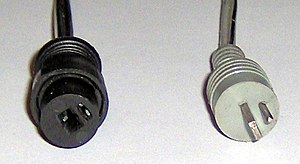Connectors (External): Difference between revisions
No edit summary |
|||
| Line 23: | Line 23: | ||
[[file:speaker din male and female.jpg|thumb|right|Speaker DIN line socket (left) and plug (right)]] | [[file:speaker din male and female.jpg|thumb|right|Speaker DIN line socket (left) and plug (right)]] | ||
A DIN loudspeaker connector is the same size but has just two pins, one of which is flat. This is sometimes used asa power connector on Christmas lights. | A DIN loudspeaker connector is the same size but has just two pins, one of which is flat. This is sometimes used asa power connector on Christmas lights. | ||
===Mini DIN=== | |||
[[File:ps-2-ports.jpg|thumb|left|Color-coded [[PS/2 port|PS/2]] connection ports (purple for keyboards and green for mice) on the rear of a personal computer]] | |||
This has been used for various purposes. Like the standard DIN, it comes in various configurations from 3 to 9 pins. In the 6 pin variant it's mostly remembered today as the standard PS/2 PC keyboard and mouse connector before USB became the norm. Early USB keyboards and mice often came with a USB to PS/2 adapter. These didn't convert USB to PS/2 - such keyboards simply sensed which protocol to talk by the voltages it sensed o the USB plug. | |||
Older laptops sometimes had a 4-pin mini DIN socket for S-video output. | |||
<br clear=all> | <br clear=all> | ||
Revision as of 20:36, 11 March 2023
This page will help you identify many common types of connector.
Summary
There are many types of connector, which can be confusing. This page will help you identify many of them, and in some cases, indicate whether a simple adapter will enable you to connect one type to another.
Safety
- Always make sure that a connector is fully engaged. Never force it, and never pull it by the wire to unplug it.
Audio and Miscellaneous Connectors
Standard DIN
DIN connectors are primarily intended for analogue audio. The commonest are the 5-pin type which were often seen on cassette recorders when they were still much in use. The 5 pins were used for left and right, record and playback, plus ground return.
The same connector is still seen on digital musical instruments such as keyboards where they are used for MIDI. (Note that the MIDI lead marked Out goes into the socket marked In and the lead mark In into the socket marked Out.)
Different versions having from 3 to 8 pins are sometimes seen, occasionally as a power connector or for various other uses. DIN lounspeaker
A DIN loudspeaker connector is the same size but has just two pins, one of which is flat. This is sometimes used asa power connector on Christmas lights.
Mini DIN

This has been used for various purposes. Like the standard DIN, it comes in various configurations from 3 to 9 pins. In the 6 pin variant it's mostly remembered today as the standard PS/2 PC keyboard and mouse connector before USB became the norm. Early USB keyboards and mice often came with a USB to PS/2 adapter. These didn't convert USB to PS/2 - such keyboards simply sensed which protocol to talk by the voltages it sensed o the USB plug.
Older laptops sometimes had a 4-pin mini DIN socket for S-video output.
Phono
Phono, or more correctly RCA connectors are commonly used for audio and video. For stero audio there will be two, usually red and white. For analogue video there may be a single yellow connector for composite video, or red, green and blue for component video, and perhaps yellow and white for horizontal and vertical sync.
Adapters and Compatibility
Audio leads are available to connect two phono connectors to a stereo jack connector.
Video leads or adapter allow you to connect between VGA or SCART connectors and phono connectors.
Jack
1/4", 3.5mm
XLR
RF
Aerial
BNC
F
Video Connectors
For a comprehensive list, see List of video connectors in Wikipedia.
SCART
Phono
S-Video
VGA
HDMI - Std, Mini, Micro
DVI - various
DisplayPort
Data Connectors
D-type: 9, 15, 25 pin
RJ45
RJ11
USB A, B, Mini, Micro, C
SATA
PATA
What was the Apple one?
Thunderbolt
Lightning
Power Connectors
Laptop
General purpose round


